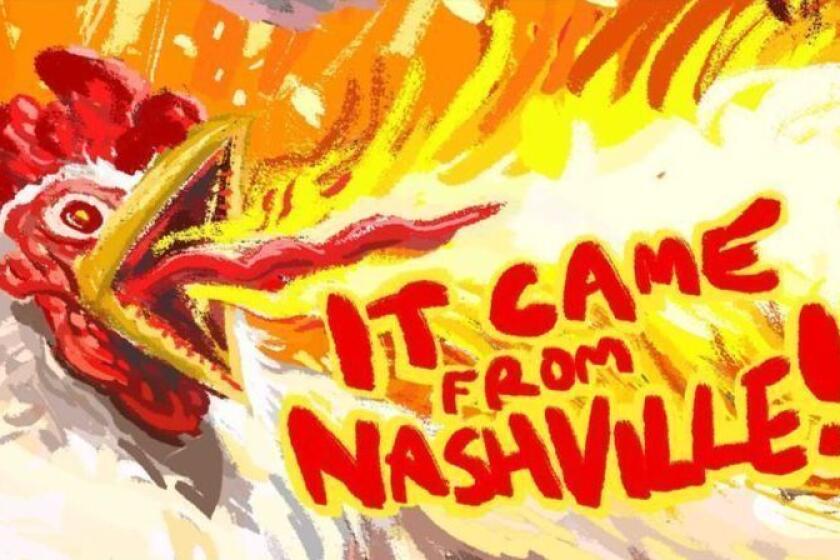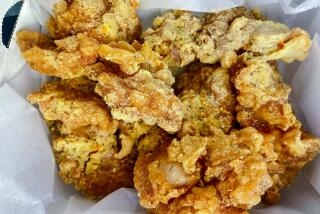KFC and Beyond Meat are testing plant-based ‘chicken’ nuggets and wings
More and more, releases of plant-based “meats” look like sneaker drops: a short advance notice that leads to long lines outside restaurants and flurries of supportive and snarky tweets.
To date, most of these splashy fake-meat product drops have hyped beef substitutes. Now there’s a bigger shift happening. First they came for our burgers. Now Beyond Meat, Tyson and a number of startups are gunning, so to speak, for our chicken nuggets.
The LA Times Food section is debuting a new cooking column dedicated to vegan and vegetarian recipes that celebrate plants.
This week, KFC followed the playbook with its newest product launch: With only 24 hours’ notice, one suburban Atlanta branch painted its exterior green and served plant-based “chicken” nuggets and boneless “wings” made by Beyond Meat.
The El Segundo company first introduced chicken strips made from pea protein to grocery stores in 2012. But its biggest success has come from the Beyond Burger, now sold in the fresh meat case in mass-market grocery stores such as Ralphs, Albertsons and Vons as well as at Carl’s Jr. The company went public on May 1 — its stock is now worth six times its introductory price — and Beyond Meat’s rivalry with Impossible Foods, maker of the Impossible Burger, has only benefited the fortunes of both companies.
The appearance of green-striped buckets of Beyond Fried Chicken (tagline: “It’s still finger-lickin’ good”), made from wheat gluten and covered in KFC’s proprietary coating, offers yet more evidence that Beyond Meat is targeting mass-market meat eaters instead of sustainable food fetishists and vegans.
“KFC is always keeping a pulse on the latest food trends,” the company said in a statement. It said it rolled out the “limited test” in Atlanta to gauge interest; Beyond Meat said the vegan chicken sold out in five hours. So why the nugget?
The idealistic might point out that U.S. farmers raised more than 9 billion chickens a year, much of them in factory farms. Earlier this year, an international commission published a diet in the medical journal Lancet that recommended that, in order to prevent climate change, humans should eat less than 50 grams of meat a day. Considering that the average American consumed more than twice that amount of chicken last year, that’s a lot of animals to replace with soy and pea protein.
The financially minded would argue that nuggets are big business. According to research firm NPD, U.S. restaurants sold 2.3 billion servings of chicken nuggets last year, and that figure doesn’t include the frozen bags of Yummy Dino Buddies dinosaur-shaped Chicken Nuggets sold at Target. And the market for alternative meats is still relatively small — according to the Plant-Based Foods Assn., grocery sales totaled $800 million last year — but grew 10% percent over the year before, driven in part by the popularity of the Beyond Burger.
When it comes to the faux nugget, Impossible Foods would hardly be Beyond Meat’s only competitor. MorningStar Farms, Boca Burger, Gardein and Quorn all have breaded nuggets in the freezer cases of grocery stores.
Even meat-processing giants are getting in on fake meat. Tyson Foods, whose venture-capital arm invested in Beyond Meat in 2016, sold its stake in the company the week before its IPO and flipped from investing to competing. Tyson claims its new Raised & Rooted nuggets made with pea protein and egg white will hit 4,000 grocery stores by the end of September.
LA Times Food just launched Plants, its new vegan and vegetarian cooking column. Here are six more recently published fresh, fast, and easy vegan recipes.
The chicken company dove into product research after noting omnivorous excitement in plant-based meats, according to Justin Whitmore, executive vice president of alternative proteins.
He touted the veggie nuggets’ lower saturated fat and higher omega-3 fatty acids, but backed away from arguing the product’s primary appeal to customers was nutritional.
“Chicken has a fairly strong health halo,” Whitmore said. “However, what I do think is happening is broader than just chicken. It’s that protein is growing as a category, and the sources of protein that consumers are looking for are more varied.”
Taking a different tack, Just, the San Francisco producer of eggless mayonnaise and scrambled egg substitute, currently claims that it will be able to produce the first chicken nugget made with animal cells cultured in vats by the end of the year. To form the nugget, Just is blending a paste of meat cells with mung-bean protein for texture.
“Because the cells are so clean, it has more of a chicken flavor than you’d anticipate,” Nathaniel Park, Just’s director of product development, said of the prototypes. “Super clean and more forward in umami chicken depth.”
Kim Prince spent most of her childhood standing on the pickle buckets in flour-dusted shoes at her family’s hot chicken shack off Clarksville Highway in Nashville.
Vítor Espírito Santo, Just’s director of cellular agriculture, said the hurdles that need to be overcome for the product to come to market — and by “to market” he’s talking a few test restaurants in Asia, followed by a slow international rollout — are financial (bringing the per-portion cost under $50) and regulatory (convincing the FDA and USDA that cultured meat is safe to eat).
Christie Lagally, founder and chief executive of a Seattle startup called Rebellyous that is currently selling soy-wheat nuggets at a handful of cafeterias and restaurants in the Pacific Northwest, points out that half of the chicken sold in America is already pre-cooked in the form of strips or breaded chunks. She has no interest in the other 50%. “Nobody wants to replicate raw chicken,” she said. “It’s just gross.”
With $3.3 million in seed funding, Rebellyous will open a plant in October capable of producing hundreds of thousands of pounds of non-chicken a month. Lagally, once a mechanical engineer at Boeing, said she has improved on Gardein and Boca’s manufacturing process to create a firm, juicy nugget — and she picked soy and wheat for her protein sources because they’re the only alternative proteins that the USDA recognizes for the school lunch program. Her ultimate target is the 98,000 school districts nationally that comply with those guidelines.
Another reason nuggets are so attractive to imitators: It’s hard to argue that actual chicken nuggets look and taste like chicken. Springy, meat-like, coated in crunch, yes. Apart from that, the bar for replicating the nugget is low.
So the KFC-Beyond Meat experiment raises the question: Do we eat KFC for the spices on the nubby coating or to nuzzle out every bit of glistening flesh from between the wing bones? The chain’s vegan nuggets, if they take off, would sidestep Americans’ distaste for the visceral aspects of meat: the sinews that get caught in our teeth, the jiggly chunks of half-solid fat. We eat nuggets precisely because they aren’t chicken on the bone. It remains to be seen whether we’ll eat nuggets that aren’t chicken at all.
More to Read
Eat your way across L.A.
Get our weekly Tasting Notes newsletter for reviews, news and more.
You may occasionally receive promotional content from the Los Angeles Times.












